- Fact Checked
- August 29, 2025
- 23 min read
What Is Polycystic Ovary Syndrome? The Causes, Symptoms & Diagnosis of PCOS
Table of Contents
Table of Contents

If you're struggling with irregular periods, unexpected weight gain, and skin issues brought on by PCOS, it's easy to feel completely alone. But the truth is PCOS affects millions of women, and while it can't be cured, it can be managed, often through simple lifestyle changes. That's what we're going to be talking about in this post: what PCOS is, how it impacts your body, and how you can find relief from uncomfortable symptoms.
This post is for informational purposes only and does not constitute medical advice. See full disclaimer below.
What is PCOS?

Polycystic ovary syndrome is a hormonal disorder that affects how your ovarian function works1. Despite the name, you don't actually need to have cysts on your ovaries to have PCOS - confusing, right? The "polycystic" refers to the appearance of multiple small follicles on the ovaries that show up on ultrasounds, but these aren't true cysts or fluid-filled sacs2.
At its core, PCOS is about hormonal imbalance3. Your body produces higher than normal levels of androgens (male hormones that all women have, just usually in smaller amounts). This hormonal chaos affects everything from your menstrual cycle to your metabolism, which is why PCOS symptoms can feel so all over the place.
Is PCOS Inherited?

PCOS tends to run in families - research clearly shows that genetics play a significant role in who develops this condition. If your biological parent has PCOS, you're more likely to have it too, with daughters having a 20-40% chance of developing the condition. Sisters of women with PCOS face up to a 40% increased risk compared to the general population.
Why PCOS Doesn't Follow Simple Inheritance Patterns
Unlike traits such as eye color or blood type that follow straightforward inheritance patterns, PCOS involves complex, multifactorial inheritance. Think of it like baking a cake - instead of one main ingredient determining the outcome, PCOS results from many genetic "ingredients" mixing together, each contributing a small effect.
This means that, unlike other conditions, there is no one PCOS gene. Instead, a vareity of genes work across different chromosomes to influence your PCOS risk.
Also unlike other conditions, just because your genetics put you at increased risk does not mean you will automatically have PCOS. Certain lifestyle factors, like stress and diet, influence your genetics and determine whether or not PCOS develops. This is why PCOS can present so differently, even among siblings in the same family. Not only can siblings inherit different sets of genes from their parents, but different lifestyle or environmental factors can determine whether genes get turned "on" or "off."456
The Male Connection and Transgenerational Patterns
Though men can't develop PCOS because they are missing the "ovary" piece, research does show that male relatives of women with PCOS do have a higher risk of diabetes, heart disease, and male-pattern baldness. This indicates that PCOS-related genes do affect both sexes, just differently.
Men can also pass down these PCOS-related genes to their daughters or granddaughters, meaning your genetic risk of PCOS doesn't just come from your mother. This is likely why women can develop PCOS without any maternal family history of the condition.
Genetics Across Different Populations
Interstingly, PCOS can also present differently amongst different populations, particularly when it comes to symptoms. For example, women of South Asian descent often experience more severe insulin resistance, while women of European descent might have more prominent reproductive symptoms.
This is an area of research that needs more development, but can prove important in helping people develop treatment approaches that are tailored not only to their lifestyle but their genetics.
The Future of Genetic Understanding
So while it's clear genetics play some role in PCOS, they aren't the full story. And in fact, what role they play isn't entirely understood, but with more research, it hopefully will be and will open the door to things like genetic screenings that could identify at-risk individuals before symptom development, personalized treatment approaches, and potentially even (one day!) targeted therapies based on specific genetic pathways.
What Causes PCOS and Risk Factors
The exact cause of PCOS isn't fully understood - and honestly, that can be frustrating when you just want answers. What we do know is that it's likely a combination of factors working together:
Core Risk Factors

Family history - PCOS tends to run in families, with research clearly showing that genetics play a significant role in who develops this condition. The complex interplay of multiple genes, environmental factors, and lifestyle choices influences both whether PCOS develops and how it manifests.
Insulin resistance is a major player. Many women with PCOS have trouble using insulin effectively, which can lead to higher insulin levels. This excess insulin can trigger your ovaries to produce more androgens.
Inflammation in the body may contribute to insulin resistance and higher androgen production. This is why anti-inflammatory lifestyle approaches often help with PCOS management.
The Bidirectional Relationship Between PCOS and Obesity
The relationship between PCOS and obesity is more complex than many realize - it's truly a two-way street. While obesity can increase your risk of developing PCOS7, having PCOS itself makes weight management significantly more challenging due to several hormonal and metabolic disruptions:
- Higher androgen levels can promote fat storage, especially around the midsection
- Insulin resistance makes it harder for your body to use glucose efficiently, leading to increased fat storage
- Hormonal imbalances can affect hunger and satiety signals, making you feel hungrier more often8
- PCOS can slow your metabolic rate, meaning you burn fewer calories at rest
This two-way street creates a cycle where PCOS symptoms can worsen with weight gain, but the condition makes it hard to lose extra weight and ease symptoms. For many women, this can feel incredibly defeating, but know that you are not alone, you aren't a failure, and if you keep reading, we have management strategies that can help.
Environmental Endocrine Disruptors: An Emerging Risk Factor
We mentioned earlier that environmental factors interact with genetics in a way that can increase your PCOS risk. But what are these "factors" exactly? Many times, they are chemicals found in everyday items, with the most common being:
- BPA (bisphenol A) found in plastic containers, food packaging, and receipts
- Phthalates present in cosmetics, fragrances, and flexible plastics
- Certain pesticides and herbicides used in agriculture
- Industrial chemicals in household products and building materials
These chemicals can potentially contribute to PCOS by disrupting hormone signaling pathways and general ovarian function, increasing insulin resistance, and triggering inflammatory responses that can worsen existing symptoms.
More research needs to be done to understand this link fully, but reducing exposure may be beneficial for overall hormonal health. Many times, this comes through easy product swaps, like choosing glass over plastic containers and organic produce over non-organic.
How Early Life Increases PCOS Risk
Along with your inherited genetics, there's an emerging theory that events that happen in utero (so when you are in your mother's womb) as well as during early childhood can influence your PCOS risk later in life9. Of course, being an emerging theory, more research needs to be done, but early evidence shows that certain prenatal factors may influence your risk of PCOS, particularly:
- Maternal insulin resistance or diabetes during pregnancy
- Exposure to higher androgen levels in the womb
- Maternal obesity or poor nutrition during pregnancy
- Prenatal exposure to environmental toxins
As for how early childhood events can contribute to PCOS, researchers are studying the link between PCOS and:
- Rapid weight gain during infancy
- Early puberty onset (before age 8)
- Childhood obesity or metabolic dysfunction
- Chronic stress or trauma during developmental years
Even if science does find a link between these early life events and PCOS, remember this doesn't guarantee that you or anyone else will or won't develop PCOS. But it can help understand how genetics, life events, and other triggers can work together.
Life Transitions That Can Trigger PCOS

Because PCOS is influenced by a variety of factors—genetics, life events, and lifestyle, to name a few—that also means it develops on different timelines10. Some people may have their first symptom flare-up early in life, while others may not experience symptoms until perimenopause.
Generally, though, PCOS seems to be triggered during times that involve big hormonal changes, with the most common being:
Puberty
That rollercoaster of hormones in your teen years can trigger first PCOS symptoms. For many, irregular periods or excess hair growth first show up during adolescence.
Major stress
Big life changes, trauma, illness, or even extreme dieting can stress out your hormonal system and activate PCOS symptoms.
Pregnancy and postpartum
The huge hormonal swings during and after pregnancy can sometimes reveal PCOS in women who didn’t realize they had it (or make previously mild symptoms more noticeable).
Perimenopause
As estrogen levels rise and fall before menopause, some women notice PCOS symptoms worsening, especially things like weight gain, mood changes, or insulin resistance.
Medication changes
Starting or stopping birth control or taking meds like corticosteroids can also set off PCOS in women who are already predisposed, particularly through genetics.
Why PCOS Looks Different Around the World
Of course, every body is different, which means that no two women will experience PCOS the same by the simple fact that they're two different people with different sets of genetics, health history, and lifestyles. However, interestingly, when we talk about larger PCOS trends, we find that PCOS looks different around the world.
For example, South Asian women (Indian, Pakistani, Bangladeshi) experience:
- Higher risk of insulin resistance and type 2 diabetes
- Metabolic issues often appear younger and hit harder
- Increased risk of heart disease
- Health risks at lower BMIs than other groups
- While Hispanic and Latina women experience:
- Higher rates of PCOS overall
- Stronger insulin resistance
- More frequent metabolic syndrome
Where a person matters, too. Not only do different countries and cultures have different diets that can shape overall metabolic health, but living in a city may mean more exposure to hormone-disrupting chemicals that can trigger dormant PCOS symptoms.
Different regions also have different access to healthcare and different cultural views on PCOS symptoms, both of which can skew diagnosis rates.
Recognizing PCOS Symptoms

Symptoms of PCOS can vary wildly from person to person, which is part of what makes it tricky to diagnose. Some women notice multiple obvious symptoms early on, while others have only subtle changes—or no symptoms at all—until they try to get pregnant or start gaining weight for unexplained reasons. It's even possible to have mild PCOS, where the signs are present but not severe enough to be noticed without medical testing.
Common Symptoms
For many, the first clue is a menstrual cycle that never seems predictable. Your periods may come more than 35 days apart, or disappear for months at a time. Alongside cycle irregularities, you might notice:
- Excess hair growth on the face, chest, or back
- Hair loss on the scalp
- Unexpected hair growth on the armpits, chest, or abdomen
- Weight gain or difficulty losing weight
- Patches of dark skin on the neck, armpits, groin, and under the breasts
- Skin tags
- Intense fatigue
- Sleep issues, including sleep apnea
Emotional and Social Impact
For many women, the physical symptoms of PCOS can have a negative effect on their mental health and overall self-esteem, especially those symptoms like unwanted hair growth, acne, or hair thinning.
On top of how these symptoms affect confidence, the hormonal fluctuations can also cause mood swings, anxiety, and even depression.
That's why effective management of PCOS addresses the physical and the emotional aspects of the condition through counseling and support groups. Your doctor should be able to provide you recommendations for both.
Why Severity Varies
Not every woman experiences the same intensity of symptoms. For some, symptoms are more severe when combined with obesity, as higher body weight can worsen insulin resistance and androgen levels. Symptoms may also change or become more noticeable at certain life stages—during puberty, after weight changes, under stress, during pregnancy, or around menopause. Recognizing that symptoms can wax and wane helps you anticipate when to be more proactive in seeking care.
How PCOS is Diagnosed and Tested

Getting a PCOS diagnosis can feel like detective work, and there's no single test that can definitively diagnose it. The process typically takes several appointments and tests, so knowing what to expect can help you feel more prepared and confident advocating for yourself.
Doctors typically use the Rotterdam Criteria, which requires you to have at least two of these three features:
- Irregular ovulation or no ovulation
- High levels of androgens
- Polycystic ovaries on ultrasound
What to Expect During Your Appointments
When you first go to see your doctor with symptoms of PCOS, they will likely ask you about your menstrual patterns, symptoms, family history, medications, and lifestyle factors. They may also ask you about things like sleep patterns, stress levels, and mood changes. While these may feel unrelated and perhaps a little personal, it's important to answer all of them openly and honestly, as it can help them get to a more accurate diagnosis quickly.
From there, they will move on to a physical exam that includes checking your weight, blood pressure, and examining your skin for signs of unusual acne, excess hair growth, or dark skin patches. All of these are signs of high androgens (aka 1 of the 3 criteria for a PCOS diagnosis).
Blood Tests: What They're Looking For
The blood work for PCOS can seem extensive, but each test provides important clues:
Hormone tests are typically done during the first few days of your cycle (if you're having periods) or at any time if your periods are very irregular:
- Total and free testosterone - elevated levels suggest high androgen activity11
- DHEA-S (dehydroepiandrosterone sulfate) - another androgen that might be elevated
- Androstenedione - often elevated in PCOS
- LH and FSH - the ratio between these hormones is often altered in PCOS (typically LH is higher than FSH)
- AMH (Anti-Müllerian Hormone) - usually elevated in PCOS and correlates with the number of follicles on your ovaries
Metabolic tests help assess insulin resistance and diabetes risk12:
- Fasting glucose and insulin - shows how your body handles blood sugar
- Oral glucose tolerance test (OGTT) - you'll drink a sugary solution and have blood drawn at intervals to see how your body processes glucose
- HbA1c - gives a picture of your average blood sugar over the past 2-3 months
- HOMA-IR calculation - uses your fasting glucose and insulin to calculate insulin resistance
Other important tests include:
- Lipid panel - cholesterol and triglyceride levels
- Thyroid function (TSH, T3, T4) - to rule out thyroid disorders
- Prolactin - to exclude other hormone disorders
-
17-hydroxyprogesterone - to rule out congenital adrenal hyperplasia
Ultrasound Examination
The transvaginal ultrasound (or abdominal if you haven't been sexually active) looks for the characteristic appearance of polycystic ovaries. The technician will count follicles and measure ovarian volume. According to current criteria, polycystic ovaries have 20 or more follicles measuring 2-9mm in diameter, or increased ovarian volume.
While not as comfortable as an abdominal ultrasound, transvaginal ultrasounds do provide clearer images, so they are often preferred by your provider. If for whatever reason you aren't comfortable with that, though, have a conversation with your doctor so they can work withi your comfort level.
Additional Tests You Might Need
While physical exams, blood tests, and ultrasounds are the standard for PCOS diagnosis, your doctor may request additional testing if your symptoms permit, like:
- Sleep study
- Blood pressure monitoring and/or an EKG
- Mood assessment questionnaires
These help your doctor screen for other conditions, like sleep apnea, anxiety, and depression, all of which are higher in people with PCOS.
Timeline and Follow-up
PCOS is not a same-day diagnosis. In fact, most women report that it takes anywhere between 4 and 8 weeks from their initial appointment to have an official diagnosis. Where you fall within this time depends on your doctor, as some prefer to repeat certain blood tests to confirm abnormal results before making a PCOS diagnosis.
You can help the process go as smoothly and quickly as possible by following all your doctors instructions when it comes to test prep, like:
- Fasting 8-12 hours before metabolic blood work
- Scheduling hormone tests for early in the morning
- Keeping a symptom diary
- Bringing a list of all medications, supplements, and vitamins you're taking to your next appointment
If results are borderline or unclear, don't be discouraged. PCOS exists on a spectrum, and some women have milder forms that take time to diagnose definitively. Your doctor might want to monitor you over several months or repeat certain tests.
Remember, getting a diagnosis is often a relief after months or years of wondering what's going on with your body. Having a name for what you're experiencing is the first step toward effective management.
What PCOS Can Be Confused With
PCOS shares symptoms with several other health conditions, which is why getting the right diagnosis matters:
- Thyroid disorders can cause irregular periods, weight changes, and mood issues. Your doctor should test your thyroid function as part of the diagnostic process
- Cushing's syndrome can cause weight gain, skin changes, and excess hair growth
- Congenital adrenal hyperplasia is a genetic condition that can mimic PCOS symptoms
- Hyperprolactinemia (high prolactin levels) can cause irregular periods and other PCOS-like symptoms
- Insulin resistance or diabetes can exist independently of PCOS but share many metabolic symptoms
This is why comprehensive testing is so important - treating the wrong condition won't give you the relief you're looking for.
Health Implications and Associated Conditions

Having PCOS does put you at a higher risk for other conditions. This is not meant to overwhelm you or scare you (especially because dealing with the symptoms of PCOS can be overwhelming enough). It's simply to help you take proactive steps for prevention and early intervention.
Women with PCOS also need to be particularly mindful of:
Metabolic and Cardiovascular Concerns
Because PCOS often includes greater insulin resistance, it puts women at greater risk of other conditions like:
- Type 2 diabetes, which affects up to 50% of women with PCOS by age 40
- High blood pressure, which occurs in 25-35% of women with PCOS, regardless of their weight
- Lipid abnormalities, particularly high LDL ("bad") cholesterol and low HDL ("good") cholesterol
- Metabolic syndrome, which occurs in 33-47% of women with PCOS
- Heart disease, which is 4-7 times higher in women with PCOS
Obesity plays a dual role in all of these conditions, too. Not only is it a risk factor for developing PCOS, but it can also put you at an increased risk for these other conditions. As many as 50-80% of women with PCOS struggle with weight management due to how hormone imbalances affect both metabolism and hunger signals.
Reproductive Health Complications
Given that PCOS affects the ovaries and the reproductive system, it is only natural that it has a larger impact on reproductive health, including increased risk of:
- Infertility, which affects 70-80% of people with PCOS
- Endometrial cancer, which may be 2-6 times higher than in women without PCOS
- Gestational diabetes, which occurs in 20-50% of pregnancies in women with PCOS
- Preeclampsia, which is 2-3 times more likely in women with PCOS
For all these reasons, many women with PCOS find it helpful to find an OB-GYN who is familiar with the condition to help them navigate conception and pregnancy.
Mental Health and Sleep Disorders
Not only do the physical symptoms of PCOS take a mental toll, but hormone levels can also greatly impact our overall mood. For these reasons, women with PCOS are at greater risk of:
- Depression, which affects 28-64% of women with PCOS
- Anxiety, which is present in 34-57% of women with PCOS
- Eating disorders like binge eating disorder, which affects up to 25% of women with PCOS
Women with PCOS are also at greater risk of developing the sleep disorder sleep apnea, even if they are at a normal weight. As many as 70% of women with PCOS have sleep apnea, while others also report general insomnia, restless leg syndrome, and poor sleep quality due to hormonal fluctuations.
Tips for Living Well with PCOS

There are so many things about this condition that feel outside of your control, but the truth is, you can thrive, even while living with PCOS. Here are some ways that you can support your body, reduce your risks, and feel amazing.
Nourish Through Nutrition
A balanced plate with protein, healthy fats, and complex carbs can help keep blood sugar steady and reduce insulin spikes. Since PCOS often makes the body more sensitive to blood sugar changes, this balance is especially important.
Adding anti-inflammatory foods like fatty fish, leafy greens, berries, and nuts can also help calm the chronic inflammation tied to PCOS.
Meal timing matters too. Eating meals at the same time every day can support hormone balance and improve insulin sensitivity over time.
Get Regular Exercise
Strength training is a powerful tool for PCOS, boosting insulin sensitivity and supporting healthy weight management. Pairing this with moderate cardio like walking, swimming, or cycling can also support metabolic and cardiovascular health.
Stress Management
Chronic stress ramps up cortisol and inflammation, which can make PCOS symptoms worse. That’s why finding stress management practices that fit into your life is essential.
While meditation, journaling, and deep breathing can help you regulate your nervous system and feel more grounded, don't forget that the best stress management starts with good sleep hygiene. Aim for 7-9 hours of quality sleep a night. If sleep apnea is interfering with that, talk to your doctor about how you can manage it.
Supporting Hormonal Balance Through Your Cycle
Living with PCOS often means dealing with unpredictable hormones. Irregular periods and stronger-than-usual PMS symptoms are common, and they can make your cycle feel harder to manage. Simple lifestyle shifts and carefully chosen supplements can help balance hormones and ease symptoms, making it easier to feel like yourself throughout the month.
Happy V PMS Support is the only phase-based, science-backed formula designed specifically for the hormonal shifts that happen during your cycle. Unlike general supplements, this tincture is formulated to work with your body's natural hormone changes during the luteal phase and through menstruation (aka the times when PCOS-related symptoms often feel most challenging).
How Happy V’s PMS Support formula supports PCOS management:
- Vitamin B6 & Zinc - Critical for PCOS as they support progesterone function and help counterbalance androgen excess, while promoting mood stability during hormonal fluctuations
- 5-HTP, B6, Folate, B12 - These nutrients work together to promote serotonin production, which can be disrupted in PCOS due to insulin resistance and hormonal imbalances, helping reduce mood swings and anxiety
- Vitamin D, B1, B2, B3 - Particularly important for women with PCOS who often experience fatigue due to insulin resistance and metabolic dysfunction; these nutrients support energy metabolism and immune balance
- Vitamin A & Biotin - Target skin health, addressing the acne and skin changes that commonly accompany androgen excess in PCOS
- Cuvitus® Cucumber Extract - Helps ease bloating and cramping, which can be more intense in women with PCOS due to hormonal imbalances
Basically, Happy V is designed to provide targeted support for mood swings, energy crashes, skin problems, and inflammation, hitting multiple PCOS challenges at once during your most hormonally difficult days.
Frequently Asked Questions About PCOS

Can PCOS be cured?
There is no cure for PCOS, but symptoms can be effectively managed with proper treatment and lifestyle changes.
Will I be able to get pregnant if I have PCOS?
Many women with PCOS do conceive successfully, often with medical support like ovulation-inducing medications or fertility treatments.
Does PCOS always cause weight gain?
Not all women with PCOS struggle with weight. About 20% maintain normal weight, though metabolic issues can still occur.
Can PCOS symptoms improve with age?
Some symptoms may decrease after menopause when ovarian function naturally declines, but metabolic risks often persist.
Can stress make PCOS symptoms worse?
Stress makes just about everything worse. When it comes to PCOS, chronic stress can worsen insulin resistance and hormone imbalances, making PCOS symptoms more difficult to manage.
What are the main treatment options for PCOS?
PCOS cannot be cured, but it can be managed through a combination of lifestyle changes, medications, and supplements. What that combination is, exactly, depends on your symptoms and health goals.
What medications are commonly used to treat PCOS?
The two most common medications prescribed for PCOS are hormonal birth control (which helps regulate cycles) and spironolactone (which may reduce acne or excess hair).
Can lifestyle changes really help manage PCOS symptoms?
Absolutely! Nutrition, regular exercise, and weight management can improve insulin sensitivity, regulate cycles, and reduce long-term health risks.
How long does it take to see improvement with treatment?
PCOS symptoms won't disappear overnight, but most people who make consistent changes in their lifestyle report significant improvement in symptoms in 3-6 months.
How is PCOS treated if I want to get pregnant?
Fertility treatments often start with ovulation-inducing medications, followed by injectables or assisted reproductive technologies like IVF if needed.
Are there treatments for the cosmetic symptoms of PCOS, like excess hair or acne?
Yes. Options include topical creams, laser hair removal, electrolysis, acne medications, and dermatologist-guided treatments.
Can I manage PCOS naturally without medications?
Sometimes! Depending on your symptoms, lifestyle changes may be all it takes to meet your health goals. For many women, though, medications do play a role in PCOS treatment.
What ongoing monitoring is needed if I have PCOS?
Regular checkups for blood sugar, cholesterol, blood pressure, mental health, and reproductive health are all essential for people with PCOS.
Will I need to see different specialists for my PCOS treatment?
Often, yes. You may work with a gynecologist, endocrinologist, dermatologist, dietitian, or therapist as part of a multidisciplinary care plan.
Final Thoughts
Living with PCOS isn't always easy, but it's absolutely manageable with the right approach and support. Remember that small, consistent changes often have the biggest impact over time. Be patient with yourself as you figure out what works best for your unique body and situation.
You're not defined by your PCOS diagnosis. You're a whole, complex, amazing person who happens to have a hormonal condition that can be managed effectively. Focus on progress, not perfection, and celebrate every step you take toward feeling better in your body.
Keep the Conversation Going
- Visit our blog for more women’s health tips.
- Join our private Happy V Facebook group to hear from others who’ve been there.
- Explore supplements designed to support your vaginal health journey.
Disclaimer: This blog is for informational and educational purposes only and is not intended to diagnose, treat, cure, or prevent any disease. Statements about supplements have not been evaluated by the Food and Drug Administration. For more information about vaginal infections, visit the CDC or speak to a licensed healthcare provider.












